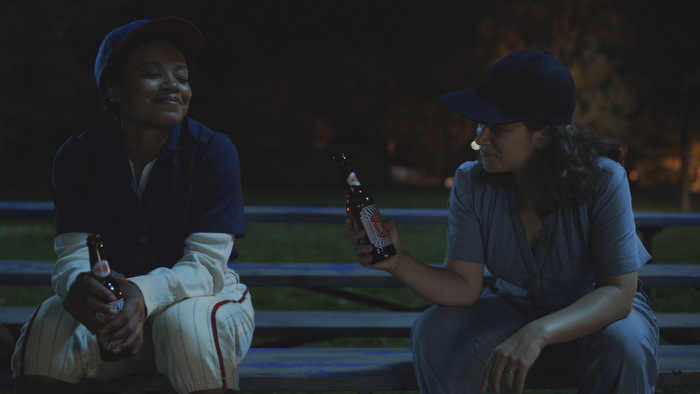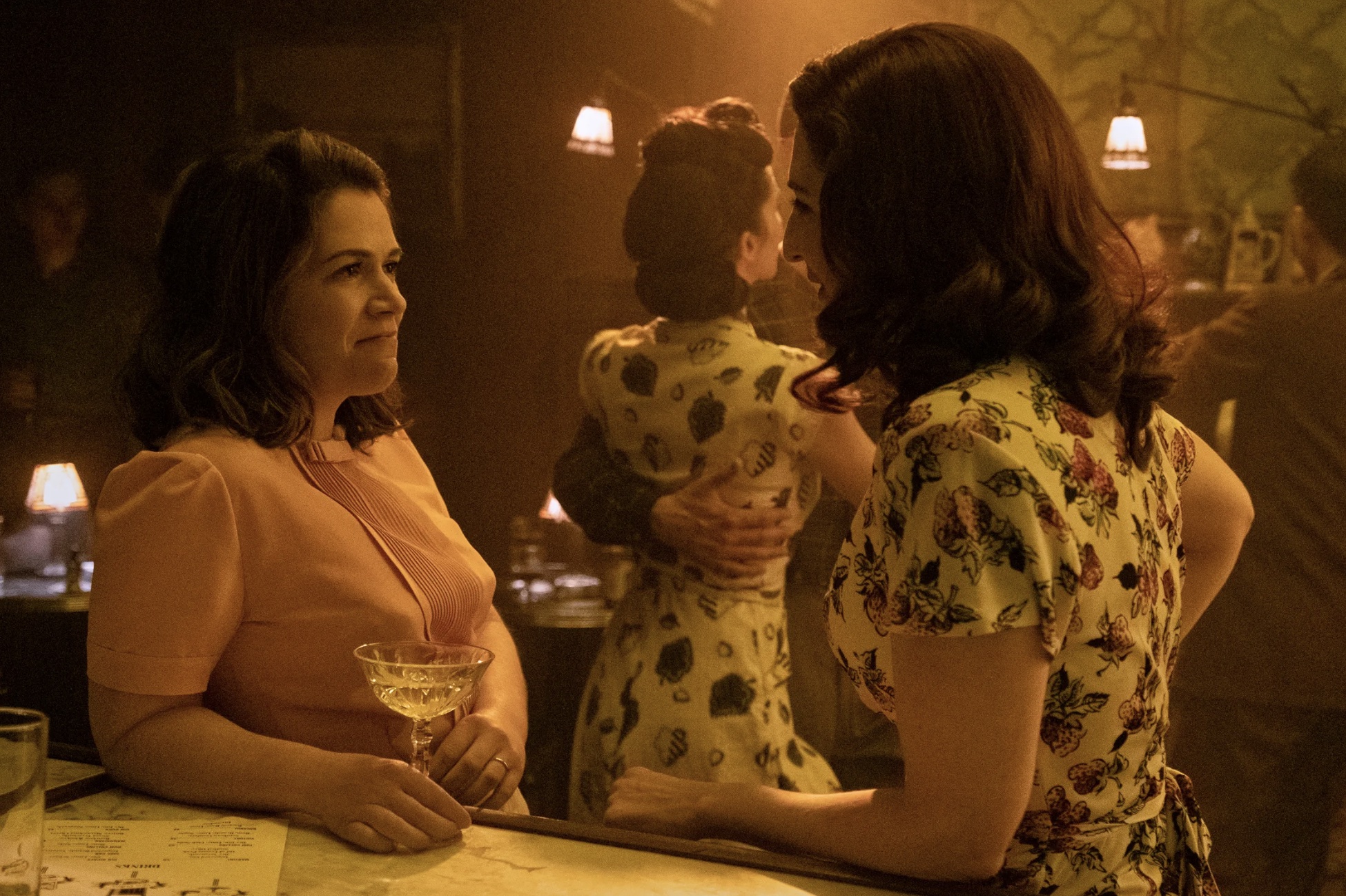I was an adult when I saw Penny Marshall’s A League of Their Own, the much-loved fictionalized account of the Rockford Peaches, an Illinois team that was part of the women’s pro baseball league in the 1940s and ’50s. I watched the film with a group of other queer women in 1992, shortly after it opened in theatres. We were arty, not sporty, dykes: we wouldn’t have watched, let alone played, a softball game. But we knew this was the closest we would get to seeing queer women characters in a mainstream movie (or most art house movies: Rose Troche’s Go Fish wouldn’t come out until 1994). And even though none of the women in the film kissed or declared themselves in love with each other, League did seem to always be on the edge of these developments, like the camera pulled away at the last minute before anything queer could happen.
Even though it wasn’t explicit, the film was still overflowing with queerness, from the close butch-femme “friendship” between Madonna’s and Rosie O’Donnell’s characters (O’Donnell wouldn’t come out to the public until 2002), to the resentment of Lori Petty’s character for the attention her more conventionally feminine, less volatile sister (played by Geena Davis) received. Petty’s character also seemed to lack any interest in romantic relationships with men (her many grandchildren in the film’s present day looked, to our eyes, like nervous overcompensation for her dykey-ness in earlier scenes).
The real women’s professional baseball league (officially the All-American Girls Professional Baseball League) was actually as queer as we suspected, with many players coming out—long after their careers were over—including, most recently, Maybelle Blair. In 2020, Chris Bolan’s documentary A Secret Love was released, centring on the 72-year relationship of two women, Terry Donahue and Pat Henschel, who got together when Donahue was playing pro baseball in the 1940s (for an Illinois team!). So it’s perhaps not surprising that the new TV series A League of Their Own (premiering on Prime Video on August 12), which is loosely based on the film and co-created (with Will Graham) by and starring Broad City’s Abbi Jacobson, is queer to its core. The sexual tension between players now culminates in makeout sessions, not just banter. And the cast has queer actors playing queer characters, among them Jacobson herself as the protagonist, Carson Shaw, and Roberta Colindrez (Vida) as one of the team’s butch players who says, “What?” when the team chaperone explains that the players can’t wear pants—and later looks as wrong and awkward wearing a skirt as many masculine-of-centre people do. The first episode has But I’’m a Cheerleader’s Jamie Babbitt as director and puts to good use her flair for comedy and her eye for the erotic underpinnings of traditional girly bonding rituals, like styling each other’s hair.

Credit: Prime Video
The original film has only one scene with a Black woman baseball player and she doesn’t even speak, but the series spends a lot of time with Black pitcher Max (Chanté Adams), who is shut out of the tryouts because of racism, and the two Latine players who make the Rockford Peaches, Colindrez as Lupe, “Lu,” and Priscilla Delgado as Esti. In spite of the glut of retreads we’ve had in film and TV lately, this League manages to seem new again because of these changes. The show is cast with unusual care. D’Arcy Carden as the tall, red-haired, flirtatious femme player, Greta, and Gbemisola Ikumelo as effervescent, chatty Clance, Max’s best friend, are standouts. Independent film veterans like Kate Berlant and Dale Dickey are part of the ensemble and, in a small but key role, original film star O’Donnell also makes an appearance. The premiere, in particular, is a delight. In spite of some anachronistic dialogue and music, it captures the hard-partying, free-spiritedness of the war years in the U.S.—and the wonder and optimism these women felt to have finally found their niche, a parallel to all the small-town queers who, at the same time, were finding each other after joining the armed forces (and would go on to form some of the first “homophile” organizations after the war).
“What if right here, right now, we forget the rules,” asks Jo (Melanie Field), Greta’s butch best friend, and she’s not talking about the rules on the field. The women’s hopefulness makes the series poignant. Even today, the best athletes who aren’t cis men—especially queer people and people of colour—are not given the respect they deserve. As I write this, one of the greatest players in the WNBA, Brittney Griner, is still in a Russian prison after six months and was just sentenced to another nine years (ostensibly for the possession of two cartridges of cannabis oil), with the U.S. government hardly in a rush to arrange her release. When we watch the series, we know from history that the “girls” league won’t last. And Stonewall, along with second-wave feminism, is more than two decades in the future for these women.
After a flawless first episode, the series drops the ball in the second and third episodes, as if someone had taken a look at everything that went right and said, “Change that!” Suddenly the focus is on Nick Offerman playing the Peaches’ coach. Like the Tom Hanks role in the film, he’s an ex-player who is upset at being put in charge of a team of women. We also get some truly terrible sitcom hijinks for Max and Clance that even actors as charming as Adams and Ikumelo can’t pull off. The Peaches are fighting among themselves and the games they play are weirdly uninvolving, even though we know and like nearly everyone on the team.
Luckily, the show’s writers at least partly come to their senses, and Offerman’s character disappears from the action as suddenly as he came—and stays gone for the rest of the season. Max finds an unexpected source of solace in her family: another masculine character, her “uncle” Bertie (Lea Robinson from Twenties) who introduces her to the local queer Black community. And we finally get to see the team win some games—and celebrate at Rockford’s queer bar. But these later episodes are still haphazardly written. We still get some stunning moments, like when Greta admits she always makes sure she is seen “on the arm of a man” before she starts a new romance with a woman. But for too many other scenes I had to restrain myself from folding laundry or scrolling through my phone to get away from what I was seeing and hearing, especially whenever Carson’s soldier husband, Charlie (Patrick J. Adams in a thankless role) turns up.
Even if these later episodes aren’t as good as the first, the show is one of the only recent reboots that clearly answers the questions: Why do a remake? Why now? It’s a series that doesn’t hedge its bets around queerness.The butch characters are recognizably masculine, not the actors wearing too much eye makeup who usually pass for butch in mainstream TV and movies. The chemistry we see building between characters isn’t just a tease. We don’t have to wonder if we imagined it. And when the characters kiss, they don’t hold back. A League of Their Own ends up being a decent queer, feminist, sports team soap opera that offers insight into queer life during the Second World War that no other series has; a show that, for once, doesn’t cheat any of us: femmes, mascs and those like Max and Carson—who discuss being somewhere in the middle—out of seeing ourselves, together, onscreen.
Season 1 of A League of Their Own is streaming Aug. 12 on Prime Video.


 Why you can trust Xtra
Why you can trust Xtra


